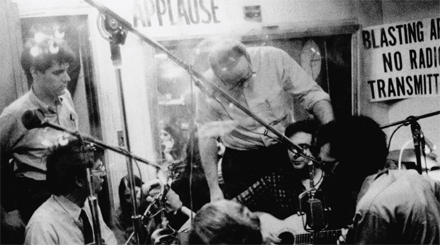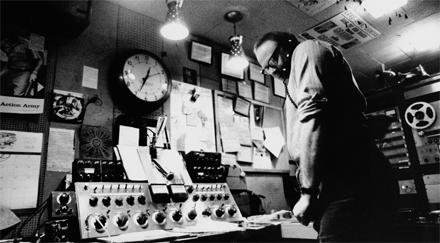Rare Book & Manuscript Library Acquires Radio Personality Bob Fass's Archive
 "Radio Unnameable" host Bob Fass with a group of in-studio guests. Courtesy of Lost Footage Films.
"Radio Unnameable" host Bob Fass with a group of in-studio guests. Courtesy of Lost Footage Films.
First aired in 1963 on New York’s WBAI, “Radio Unnameable” was a groundbreaking departure in format and philosophy from traditional radio programs: Fass connected ordinary callers with each other as well as with studio guests – cultural icons of the era including Allen Ginsberg, Bob Dylan, Timothy Leary, the Grateful Dead, and Hunter S. Thompson – in an unscripted fashion that anticipated contemporary social media.
“These were not structured interviews so much as casual ‘hang-outs’ that placed heroes of the counterculture in direct contact with listeners and one another,” said Sean M. Quimby, Director of the Rare Book & Manuscript Library. “Fass facilitated the development of the counterculture by providing a forum for activists, musicians, and everyday people to come together around shared concerns like the Vietnam War, experimental drug culture, and social justice.”
Fass earned a reputation as “the midwife at the birth of the counterculture” for his commentary on the culture and turbulent politics of the 1960s and for live coverage of such landmark events as the 1968 Democratic National Convention, the Columbia University student protests, and the Tompkins Square Riots.
Highlights from the 600,000 minutes of broadcast footage now housed in RBML include interviews with Abbie Hoffman as well as performances by and in-studio visits with Bob Dylan, Jerry Jeff Walker, and Arlo Guthrie. In addition to Fass’s broadcasts, the archive features written correspondence and photographs taken by the host himself.
Curators at RBML will now work to catalog and preserve the archive, which almost entirely resides on fragile, time-based media. The University recently launched a crowdfunding page, called "Preserve Voices of the Counterculture: The Bob Fass Archive," to support RBML's work. The recordings are relics of an era of widespread change in America, offering unique, in-depth, and unfiltered insight into the ‘60s and ‘70s. Fass’s broadcasts speak to a wide range of scholarly interests, from the relationship between music, art, and activism, to how the counterculture of the ‘60s began to fragment in the face of the identity politics of the ‘70s and ‘80s.
The Fass archive is “a vast and untapped resource that will support term papers, dissertations, and books for years to come,” said Quimby. “For all the celebrity voices and memorable performances found in this archive, there is particular value for scholars who want to better understand how this innovative new form of an old medium helped to give shape, sustenance, strength, and vibrancy to the counterculture movement.”
The archive has survived decades thanks to the efforts of listeners, fans, and friends, including filmmakers Jessica Wolfson and Paul Lovelace of Lost Footage Films, whose award-winning documentary Radio Unnameable (2012) spotlighted Fass and his legacy, and friend and former broadcaster Caryl Ratner, who led and underwrote the effort to find a home for the archive.
More than 50 years after his debut on WBAI, Fass is pleased that his broadcasts will contribute to scholars’ understanding of a tumultuous moment in American history.
“Satirist Paul Krassner [a frequent Radio Unnameable guest] said that ‘the truth is Silly Putty.’ Too much of recorded history is cold, cut-and-dry—factual. It rings false. These magnetized moments, trapped in glowing incandescent amber, invite curiosity, clear away confusion, alienation, and distance from the foggy turnpike of some 50-odd years,” Fass mused. “And what odd and wonderful years they were!”

Columbia University Libraries is one of the top five academic research library systems in North America. The collections include over 13 million volumes, over 160,000 journals and serials, as well as extensive electronic resources, manuscripts, rare books, microforms, maps, and graphic and audio-visual materials. The Libraries employs more than 400 professional and support staff and hosts over 4.7 million visitors each year. The website of the Libraries is the gateway to its services and resources: library.columbia.edu.